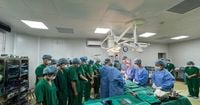On March 25, 2025, the National Hospital of Otorhinolaryngology launched an important program aimed at increasing organ donation registrations in Vietnam. This initiative was made evident at a ceremony where over 200 medical staff, including doctors and nurses, committed to donating their organs after death, responding to the urgent need for transplants in the country.
During the ceremony, Associate Professor Dr. Pham Tuan Canh, director of the National Hospital of Otorhinolaryngology, highlighted the dire situation many patients face. He explained that thousands of people in Vietnam are in desperate need of organ transplants every day. However, he noted that the number of individuals willing to register as organ donors remains modest compared to the actual needs of patients. "Today, we officially launch the organ donation registration program among all healthcare staff and call for community support. We hope every doctor, nurse, technician, and hospital staff member will be a role model, an inspiration to foster sympathy and sharing with patients in need," said Dr. Canh.
The importance of this program is underscored by statistics from the National Organ Transplant Coordination Center, which reported that in 2024, only 41 patients donated organs after death—a record high for Vietnam at the time. As of March 25, 2025, there have already been 21 registered cases agreeing to donate organs after brain death, which represents 50% of the total donations from the entire previous year. Despite this progress, Deputy Director Mr. Nguyen Hoang Phuc expressed concerns about the alarming gap between the increasing demand for organ transplants and the insufficient supply of donors.
"Many patients with organ failure have not been able to wait long enough for the organ transplants they desperately need. Some do not make it in time, or even when an organ becomes available, they are not in a suitable condition to undergo the transplant,' stated Phuc. He emphasized that this highlights the necessity for more robust efforts to encourage organ donation registration, especially for deceased donors.
Moreover, the Vietnam Association for Mobilizing Organ Donation is collaborating with various organizations to promote awareness and mobilize efforts for organ donation across healthcare facilities and communities. This campaign is vital to ensure that more organs can be harvested from brain-dead donors, making it possible to save many lives.
During the event, staff like Ms. Do Thuy Linh from the hospital shared heartfelt remarks about the impact of organ donation. "I believe that when we pass away, leaving behind part of our living body to save others suffering from severe illness is incredibly meaningful. One organ donor can save between eight to ten other people waiting for a new chance at life. Donating organs is not a loss but rather a continuation of life," she noted.
The message resonated emphatically at the ceremony, as the slogan “To Give is to Live On” was not just vocalized but also transformed into a tangible act through the participation of healthcare workers. This commitment serves as a strong testament to their responsibility and compassion toward those in need.
As Vietnam works to reshape societal attitudes about organ donation, the National Hospital of Otorhinolaryngology is leading by example. It is the first central hospital in the country to initiate a program aimed specifically at encouraging organ donation among its personnel—showcasing its commitment not just to medical excellence but also to the community and society at large.
The ongoing challenge remains a pressing one. The healthcare sector acknowledges that while progress has been made, the fight for increased organ donations is far from over. Health officials continue to stress the significance of grassroots efforts to change perceptions surrounding organ donation, with the ultimate goal of ensuring that every patient in need of a transplant has a chance at life.
By taking these steps and encouraging dialogue around the subject, healthcare professionals hope to inspire a broader societal change that will help save numerous lives in the future.





